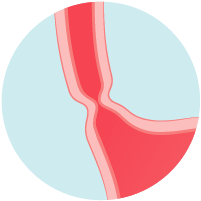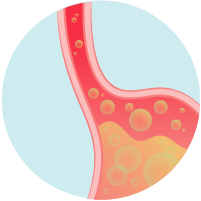Reflux and Esophageal Disorders Center
Orlando Health
About the Orlando Health Reflux and Esophageal Disorders Center
We understand the challenges that can come with gastroesophageal reflux disease (GERD) and other esophageal issues, and our compassionate team of experts is dedicated to working closely with you to craft a customized care plan tailored to your unique needs.
GERD affects one in five people in the United States. But many other conditions – including cancer and other disorders that inhibit swallowing – that can mimic acid reflux. We believe in the power of teamwork, and our collaborative approach draws upon the expertise of gastroenterologists; ear, nose and throat specialists; motility experts; surgeons; dietitians; nurses and physical therapists.
With all our services under one roof, we can more easily coordinate your care among our providers, who use the latest diagnostic tools and most advanced treatment options available. When surgery is recommended, our team is trained in the latest minimally invasive procedures, using precise robotic techniques.
Whether you are referred by your doctor or choose to visit on your own, our team will work closely with you to identify what’s happening and help you regain the joy of eating, swallowing and living without discomfort.
We treat a wide range of disorders, including:
- GERD (gastroesophageal reflux disease)
- Hiatal hernia
- Barrett's esophagus
- Reflux-related adult-onset asthma
- Peptic esophageal stricture
- Previous failed anti-reflux surgery
- Achalasia
- Scleroderma
- Diffuse esophageal spasm
- Nutcracker esophagus
- Esophageal cancer
- Esophageal perforation
- Tracheoesophageal fistula
- Zenker's diverticulum
- Eosinophilic esophagitis
- Schatzki's ring
Request an Appointment
If you have acid reflux or have been diagnosed with an esophageal disorder, our team is ready to evaluate you and develop a treatment plan that is right for you.
Diagnosis
Diagnosis begins with a thorough physical examination by your doctor, who will ask about your current symptoms and medical history. Other diagnostic tests include:
Your doctor uses a long, thin flexible tube (equipped with a tiny camera) to examine the upper part of your digestive tract, including the esophagus, stomach and duodenum (the upper part of your small intestine.) Tissues samples may be taken to test for inflammation, cancer and other diseases.
This test involves a series of specialized X-rays that examine how your esophagus works. You will be asked to swallow a chalky barium drink to help your esophagus show up more clearly in the images.
This test measures how well the muscles in your esophagus and lower esophageal sphincter are working. A catheter lined with high-resolution pressure sensors is placed in your esophagus to take readings while you swallow a liquid.
Stomach acid levels in your esophagus are measured through a temporary wireless transmitter attached to esophageal tissue.
This test is done during endoscopy while you are asleep and can measure the function of the lower esophageal sphincter and assess motility.
Treatments
The Orlando Health Reflux and Esophageal Disorders Center will design a care plan tailored to your specific condition. This could include a combination of nonsurgical and surgical treatments. The options include:
Proton pump inhibitors, histamine receptor (H2) blockers and antacids are used to reduce stomach acid.
A thin, flexible tube equipped with a special tool is used to enlarge a narrow point in your esophagus or to relax the sphincter muscles that allow food to pass through.
Endoscopic Dilation
-
Patient experiences difficulty swallowing due to narrowed section of the esophagus.
-
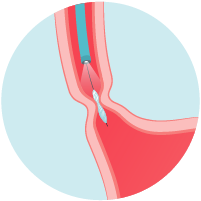
The doctor guides a balloon down to the narrowed section of the esophagus.
-
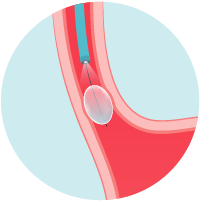
Inflation of the balloon causes the narrowed area to stretch and re-expand.
A neurotoxin is injected into the esophageal sphincter muscle to help it relax or to stop spasms temporarily.
A hiatal hernia is a condition in which the stomach bulges through your diaphragm and into the chest. It is the most common cause of GERD. In most cases, surgery is needed to put the stomach back into the abdomen, close the hole in the diaphragm muscle. A fundoplication is commonly added to strengthen the lower esophageal sphincter. Other methods to strengthen the lower esophageal sphincter, such as LINX, also exist for this purpose.
This minimally invasive procedure treats achalasia, a disorder that makes it difficult for food and liquid to pass into your stomach. Your surgeon cuts through the lower esophageal sphincter to relieve pressure. The procedure uses small abdominal incisions to reach the esophagus.
The procedure is similar to a Heller myotomy. However, it is not considered surgery, because your doctor reaches the esophagus using a thin, flexible tube inserted by way of your throat.
This minimally invasive surgery is used to treat GERD, and usually done in conjunction with a hiatal hernia repair. Your surgeon places a flexible band – made of titanium beads with a magnetic core – around the lower esophageal sphincter of your esophagus. This new valve opens and closes when food passes between your esophagus and stomach. The surgery requires small abdominal incisions.
LINX System
-
Acid Reflux with a weak lower esophageal sphincter.
-
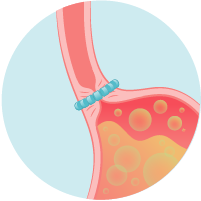
LINX system restores the body's natural barrier to reflux.
-
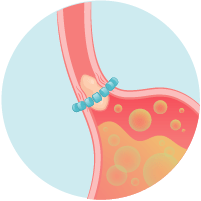
LINX system expands to allow for normal swolling.
The extensive surgery removes part or all of the esophagus. It is most commonly used in esophageal cancer treatment.
Reducing Risk
Acid reflux can lead to other more serious esophageal disorders if untreated. Here are some things you can do to prevent or reduce GERD symptoms:
- Avoid late meals and wait at least three hours after eating before lying down.
- Cut back on foods that aggravate acid reflux. Examples include spicy, citrus, fatty or tomato-based dishes. Also avoid caffeine and carbonated drinks.
- Instead of eating two or three large meals a day, go with smaller, more frequent meals.
- Avoid rushing through your meals.
- Limit alcohol consumption.
- Stop smoking or using other tobacco products.
- Raise the head of your bed or sleep with your body elevated by pillows.
- Exercise and maintain a healthy weight.
Our Team
Our specialized team includes gastroenterologists; ear, nose and throat specialists; motility specialists; surgeons; dietitians; nurses and speech therapists. They are trained in the latest surgical and nonsurgical treatments available for the full range of esophageal disorders.
The Rod Taylor Thoracic Center at Orlando Health Cancer Institute provides next-level care for esophageal cancers.
Request an Appointment
If you have acid reflux or have been diagnosed with an esophageal disorder, our team is ready to evaluate you and develop a treatment plan that is right for you.



